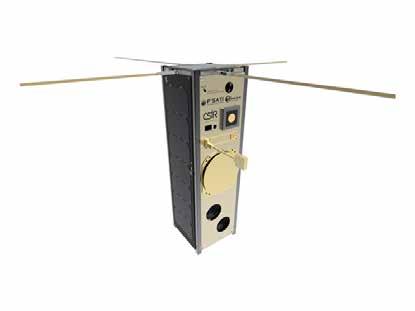
3 minute read
tvet study courses
ON THE RIGHT (STUDY) COURSE
Considering studying space sciencerelated courses at TVET colleges in South Africa? Here are some options.
Advertisement
By: Zakiyah Ebrahimm
TVET, which stands for “technical and vocational education and training”, is an international educational term that applies to a college education that aims to prepare students to become functional workers in a skilled trade. In other words, this type of education will provide you with all the necessary skills and knowledge you need for your career.
TVET Colleges are open to students who've completed Grade 9, 10, 11 or 12 at the high school level. The quality of education and training you’ll receive is internationally recognised.
In South Africa, TVET Colleges fall under the national Department of Higher Education and Training. These colleges are fully equipped to educate and train at a tertiary level and will provide you with your pathway to career success. There are 50 TVET colleges across South Africa, providing students with abundant options.
When you think of careers in space science, ‘astronaut’ is probably the first profession that comes to mind. But there are many other employment opportunities in this field. Here, we look at qualifications offered at three TVET colleges in the country and explain how you can register, what you can do with your qualification.
COLLEGE OF CAPE TOWN FOR TVET (CENTRAL METROPOLE DISTRICT)
What they offer: Mechanical Engineering
Satellite systems involve many different engineering disciplines, including mechanical engineering. Mechanical engineers design, develop, build and test mechanical sensors and devices that support space missions. As a mechanical engineer, you could be involved with the building of hi-tech space satellites.
At the College of Cape Town for TVET, you can enroll for the National Certificates N4-N6: Engineering Studies (leads to diploma). Once you’ve completed your N4-N6 Certificates, you will need to work towards obtaining your National N-Diploma, which you will qualify for through the Department of Higher Education and Training when you’ve completed at least two years of practical work experience in your specific field of study.
Duration of course:
1 year (each level is 12 weeks) + 2 years practical work experience in the industry for a National N-Diploma.
Details:
cct.edu.za | 021 404 6700 | info@cct.edu.za
EASTCAPE MIDLANDS TVET COLLEGE
What they offer: Information Technology and Computer Science
In the era of “Big Data”, computer science is considered extremely valuable in scientific astronomy. According to NASA, computers are an integral part of all current spacecraft.
John Bresina, a computer scientist at NASA, majored in both mathematics and computer science, with a specialisation in artificial intelligence (AI). His job covers a wide range of possible employment.
“The majority of what I've done at NASA is research in AI, specifically in the area of planning and scheduling, and how to apply these AI technologies to space missions. More recently, I've worked directly on space missions as part of the mission operations staff employing the technologies that I helped to develop,” he said.
Details:
emcol.co.za | 041 995 2000
PORT ELIZABETH TVET COLLEGE
What they offer: Mechatronics
As a mechatronics engineer, your career options would be manifold since your qualification would mean that you’ll have a skill set combining many fields, including electrical, mechanical and control engineering, pneumatics and robotics.
Your qualification can also lead you to work in aerospace. Programmes are currently in progress to land humans on the moon by 2024. NASA, for example, as well as its related agencies, need mechatronics engineers to assist with their goal of landing on the moon, as well as exploring Mars and beyond.
Duration of course: 3 years – full time
Details:
pecollege.edu.za | 041 509 6000 | info@pecollege.edu.za
Need funding?
The department of higher education offers bursaries available for National Certificate Vocational courses at public TVET Colleges to students who meet the criteria.
The bursaries are administered through the National Student Financial Aid Scheme (NSFAS), although other bursaries are available and vary from college to college. The NSFAS bursary covers accommodation, transport and an incidental/personal care allowance.
Some of the requirements to qualify for NSFAS funding includes: • Being a South African citizen; • Being registered or intending to register on a PLP, NC(V) or Report 191 programme at any of the 50 public TVET Colleges in South Africa; • Needing financial assistance; and • Demonstrating good academic performance.








